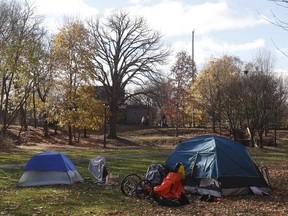Some mayors want the power to clear homeless encampments. Some businesses oppose community programs to help drug addicts. But the real solutions to these problems require resources from all levels of government.

Article content
I had never really heard the term “compassion fatigue” until I started seeing it happening in real time in the community I live in and represent. The changes in downtown Ottawa have become obvious over the last five years: more people sleeping on sidewalks and in alleyways, more erratic behaviour from people with mental health and addiction problems, more discarded needles found near schools.
Advertisement 2
Article content
People are exhausted and want to see solutions. But unfortunately, some are just asking for it all to go away, reaching for carceral solutions that are both ineffective and inhumane.
The most recent example includes a request by 13 mayors to the Ontario government to allow them to use the Notwithstanding Clause in the Charter of Rights and Freedoms to “clear” homeless encampments. And here in Ottawa, we have seen backlash in certain communities against a proposal to build Refugee Reception Centres.
In my own neighbourhood, the Chinatown Business Improvement Association just voted to oppose an application by the Somerset West Community Health Centre to establish a HART Hub — a proposal that would offer supportive housing, addiction treatment and 24/7 health care to people who live in precarious housing or on the street. Genuine exhaustion from dealing with social disorder has led business owners to fight an organization that seeks to solve the very problems they are struggling with.
How did we get here? And what do we do now?
The roots of homelessness in Canada started with bad policy decisions 30 years ago, most notably when the federal government stopped building public housing. This kicked off a slow-moving crisis that has seen the waitlist for rent-geared-to-income housing climb to more than 12,000 households in Ottawa.
Advertisement 3
Article content
Provincial policy has accelerated this crisis too. Anything built after 2018 is not subject to rent control, and a lack of provincial tenancy control means that landlords can raise the rent as much as they want between tenants. This creates incentives to evict long-standing renters, leading to an explosion in “renovictions.” In Ontario, the maximum monthly social assistance rate for a single adult is $733 for Ontario Works and $1,169 for the Ontario Disability Support Program (ODSP). The average one-bedroom apartment in Ottawa now costs $2,000 a month.
Layered on top of this is a toxic drug crisis. Many people who are experiencing homelessness are survivors of trauma and may use drugs to self-medicate or make living on the street more tolerable. There were 188 confirmed overdose-related deaths last year — more than double the number of deaths in 2019. Preliminary data suggests Ottawa is about to set yet another record for drug overdose deaths this year, with 244 people already lost to the epidemic.
As a city, we are working on solutions, even as we must beg other levels of government to help. We purchased land in Orléans and Alta Vista, with the intention of creating supportive and affordable housing hubs. An office building on Queen Street is being converted into transitional housing for newcomers and the city is also purchasing 20 scattered homes to be managed by refugee-serving organizations. We have introduced flexible housing subsidies to help prevent people from falling into homelessness and have housed hundreds of people in the last year alone. This is in addition to the millions of dollars of investment in new affordable housing, much of which will be ready for occupancy within the next three years.
Advertisement 4
Article content
We know what works to end homelessness; just ask the folks at Options Housing. They have a 92 per cent success rate in keeping formerly chronic homeless people housed after two years. The city’s recently adopted long-range financial plan for housing and homelessness aims to create 500 new affordable homes and 50 new supportive housing units per year. But we can only do this with hundreds of millions of dollars from other levels of government.
To my neighbours who are frustrated and angry about the social disorder that comes with unmet human needs, I ask you to direct your anger at the systems that are failing — not at the people experiencing homelessness or those trying to help them. The city is doing everything we can to deal with problems that are not of our own making. We need the federal and provincial governments to work with us and end homelessness for good. Striving for anything less is unacceptable.
Ariel Troster is the councillor for Somerset Ward and ia member of the Planning and Housing and Community Services committees.
Recommended from Editorial
Article content




Comments